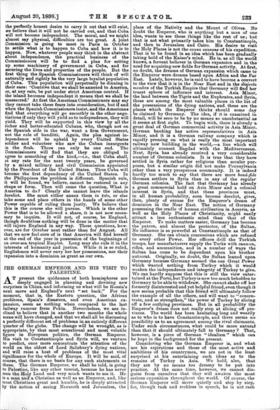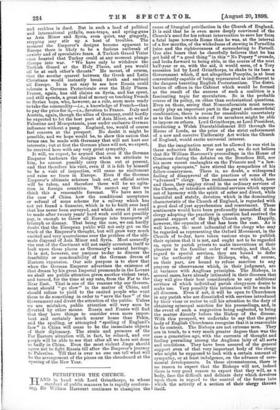ME GERMAN EMPEROR AND HIS VISIT TO PALESTINE.
AT presentthe quidnuncs of both hemispheres are deeply engaged in planning and devising new surprises in China, and informing us what will be Russia's next move and England's next "set back." For the moment, that is, the Eastern question, the African problems, Spain's disasters, and even American ex- pansion, seem as nothing when compared to the last railway rumour from Pekin. Nevertheless, we are in- clined to believe that in another two months the whole scene will have changed, and that we shall all be discussing a perfectly different set of problems in an entirely different quarter of the globe. The change will be wrought, as is appropriate, by that most sensational and most volatile figure in European politics, the German Emperor. His visit to Constantinople and Syria will, we venture to predict, once more concentrate the attention of the world on the oldest of Lord Salisbury's dying nations, and will raise a host of problems of the most vital significance for the whole of Europe. It will be said, of course, that there is no basis for any such statements as these. The German Emperor, we shall be told, is going to Palestine, like any other tourist, because he has never seen the Holy Land and. very much wants to see it. He is a man and a Christian as well as an Emperor, and, like most Christians great and humble, he is deeply attracted by the notion of seeing Nazareth and Jerusalem, the place of the Nativity and the Mount of Olives. No doubt the Emperor, who is anything but a man of one idea, wants to see these things like the rest of us ; but that is not what primarily takes him to Constantinople, and then to Jerusalem and Cairo. His desire to visit the Holy Places is not the causa caimans of his expedition. That is to be found in an idea which has been gradually taking hold of the Kaiser's mind. He is, as all the world knows, a fervent believer in German expansion and in the need for acquiring new fields for German activity. At first, no doubt, the dreams of German expansion which came to the Emperor were dreams based upon Africa and the Far East. Lately, however, he is said to have become a convert to the view that it is in the Near East and in the disjecta merabra of the Turkish Empire that Germany will find her truest sphere of influence and interest. Asia Minor, the land between the Tigris and the Euphrates, and Syria, these are among the most valuable places in the list of the possessions of the dying nations, and these are the places which the Emperor thinks should some day be claimed by Germany. The idea, if it is examined in detail, will be seen to be by no means so unsubstantial as it seems at first sight. To begin with, there is already a, great deal of German commercial activity in Asia Minor. German banking has active representatives in Asia. Minor, and it is a. German railway company which is rapidly pressing on what is really the most important railway now building in the world,—a line which will ultimately connect Bagdad with the Mediterranean. Next, Syria has already received a very considerable number of German colonists. It is true that they have settled in Syria rather for religious than secular pur- poses, but a similar origin did not make Pennsylvania other than a very prosperous community. It is indeed hardly too much to say that there are more bond-fide German settlers in Syria than in any of the regular German colonies. The fact that Germany has already a great commercial hold on Asia Minor and a colonial interest in Syria, and that these provinces must, in all human probability, soon become derelict, gives, then, plenty of excuse for the Emperor's dream of dominion in the Near East. The notion of Germany possessing the cradle of human civilisation in Assyria, as well as the Holy Places of Christianity, might easily attract a less enthusiastic mind than that of the Emperor. To make matters easier, Germany has become the patron, and almost the protector, of the Sultan. No influence is so powerful at Constantinople as that of Germany. She can obtain concessions which are refused to every other Power. Her officers drill the Turkish troops, her manufacturers supply the Turks with cannon, rifles, and ammunition, and in a, number of ways the Sultan has come to be dependent upon his brother autocrat. Originally, no doubt, the Sultan leaned upon Germany because Germany seemed the one Great Power which wanted nothing from Turkey which it would weaken the independence and integrity of Turkey to give. We can hardly suppose that this is still the view enter- tained at the Porte, but Turkey is now too much beholden to Germany to be able to withdraw. She cannot shake off her formerly disinterested and yet helpful friend, even though it now seems probable that this friend will ultimately follow the example of all the others, and will want to "concen- trate, and so strengthen," the power of Turkey by slicing off a few outlying provinces. But in all probability the Emperor's dream does not really stop at slicing off pro- vinces. The world has been hesitating long and wearily as to who is to have Constantinople, and there seems no possibility as to an agreement among the rival claimants. Under such circumstances, what could be more natural than that it should ultimately fall to Germany ? That, however, is a piece of German " idealism " which can be kept in the background for the present. Considering who the German Emperor is, and what are his aspirations and those of the most active and ambitious of his countrymen, we are not in the least surprised at his entertaining such ideas as to the remains of Turkey in Asia. We hold, also, that they are by no means too dreamy to be put into practice. At the same time, however, we cannot dis- guise from ourselves that they will awaken the most serious opposition throughout the world. Of course, the German Emperor will move quietly and step by step,. for, though rash and reckless in speech, he is not rash and reckless in deed. But in such a land of political and international pitfalls, man-traps, and spring-guns as Asia Minor and Syria, even quiet, nay gingerly, stepping may stir up a host of troubles. The moment the Emperor's designs become apparent to Europe there is likely to be a furious outbreak of anxiety and of speculative fears. A Turkish Grand Vizier once boasted that Turkey could at any moment plunge Europe into war. " We have only to withdraw the Turkish Guard at the Holy Places, and you would all be at each other's throats." He meant, of course, that the secular quarrel between the Greek and Latin Christians would instantly break forth and embroil all Europe. It is not easy to see how Russia could tolerate a German Protectorate over the Holy Places. France, again, has old claims on Syria, and has spent, and still spends, a great deal of money on teaching French to Syrian boys, who, however, as a rule, seem more ready to take the commodity—i.e., a knowledge of French—than to pay the price for it,—i.e., devotion to France. Italy and Austria, again, though the allies of Germany, could hardly be expected to let the best part of Asia Minor, as well as Palestine and Mesopotamia, pass under exclusive German influence without a pang. England, too, would of course feel concern at the prospect. No doubt it might be possible, and we hope would be, to show this nation that terms can be made with Germany that will not hurt our interests ; but at first the German plans will not, we expect, be received here with any very great sympathy. It will, we expect, be argued that even if the German Emperor harbours the designs which we attribute to him, he cannot possibly carry them out at present, and that therefore his visit, even if it is felt by himself to be a visit of inspection, will cause no excitement and raise no fears in Europe. Even if the German Emperor's ultimate schemes leak out, no official action will be taken, and therefore there will be no agita- tion in foreign countries. We cannot say that we think this a reasonable forecast. We have seen in the case of China how the conditional acceptance or refusal of some scheme for a railway which has not yet found a financier, which is to be built over land that has never been surveyed, and which even if it could be made after twenty years' hard work could not possibly pay, is enough to throw all Europe into transports of triumph or dismay. That being the case, we can hardly doubt that the European public will not only get on the track of the Emperor's thought, but will grow very much excited and very quarrelsome over the problem of the ulti- mate disposal of Asia Minor and Syria. Most assuredly the rest of the Continent will not easily accustom itself to look upon those places as Germany's natural heritage. It is not, however, our purpose to-day to discuss the feasibility or non-feasibility of the German dream of Eastern expansion. Our sole purpose is to show that when the German Emperor advertises the existence of that dream by his great Imperial promenade in the Levant we shall see public attention given another violent twist, and turned, for the time at any rate, from the Far to the Near East. That is one of the reasons why our Govern- ment should "go slow" in the matter of China, and should refuse to yield to the excited people who want them to do something in order to "save the face" of the Government and divert the attention of the public. Unless we are mistaken, public attention will very soon be diverted by other means. Russia and France will find that they have things to consider even more impor- tant and certainly much nearer home than Pekin, and the spoiling, or attempted "spoiling of England's face" in China will cease to be the immediate objects of their diplomacy. The strain and pressure of the Far Eastern situation will, in fact, be relaxed, and our people will be able to see that after all we have not done so badly in China. Even the most violent Jingo should agree not to fight Russia till after the Emperor's journey to Palestine. Till that is over no one can tell what will be the arrangement of the pieces on the chessboard at the opening of the New Year.



































 Previous page
Previous page